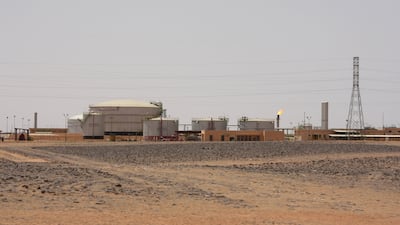Libya’s National Oil Corporation officially ceased operations at its El Feel oilfield in the south-west of the country on Monday, increasing its supply disruption amid a political crisis.
The company declared force majeure at the field on Monday, citing “current circumstances” that prevented NOC from carrying out crude oil loading operations.
Force majeure refers to an unforeseen set of circumstances preventing a party from fulfilling a contract.
Political tensions have been escalating between Libya's eastern and western governments.
Last Monday, Libya’s eastern government, supported by military commander Field Marshal Khalifa Haftar, announced the shutdown of all oilfields, suspending production and exports.
That followed a decision by the UN-recognised government in Tripoli, led by Prime Minister Abdul Hamid Dbeibah, to remove central bank governor Sadiq Al Kabir, whose role was to distribute the country's oil revenue between the two governments.
“National Oil Corporation considers these circumstances out of its control and cannot be prevented, which calls NOC to declare force majeure at El Feel crude oilfield from September 2,” it said in a statement.
The El Feel oilfield, which produces about 70,000 barrels per day, is operated by Mellitah Oil and Gas, a joint venture between NOC and Italy's Eni. It was shut down last week.
The force majeure will not be applicable to loading other hydrocarbons operations, NOC said.
The company had said last Thursday that its output was down to 591,000 barrels per day.
The country's production was 1.17 million barrels per day in July, before the latest disruptions.
“Libya faces significant downside risks due to political instability and infrastructure damage, which could further diminish its output,” Rystad Energy’s senior analyst Svetlana Tretyakova said in a note last week.
Libya has some of the cheapest, largely sweet oil in northern Africa. But much of it remained offline following a bloody civil war that erupted between rival factions after the downfall of Muammar Qaddafi in 2011.
However, since 2020, oil production has been relatively stable in the Opec producer at between 1 and 1.1 million barrels per day, except for a short period in May-June 2022.
NOC aims to bolster oil production to 2.1 million bpd by 2025, from about 1.2 million bpd currently.
While oil prices initially rose following the news, they still ended the week lower with Brent, the benchmark for two thirds of the world's oil, dropping by 1.4 per cent on Friday.
That came as traders weighed the impact of reports that Opec+ would proceed with planned output increases for the fourth quarter, restoring 180,000 barrels to the market.
Brent was trading 0.55 per cent higher at $77.35 a barrel at 8.50pm UAE time on Monday.


